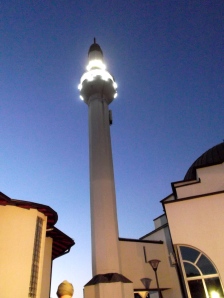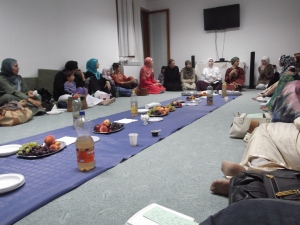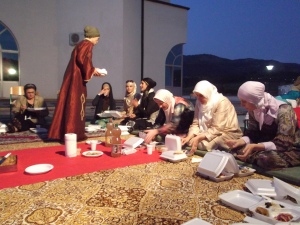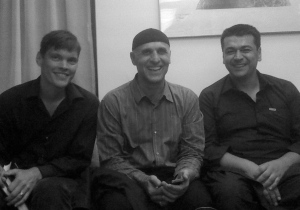What follows are my words and observations. Some things come from friends and online or other resources I have read, but mostly this is my reflection from the perspective of participating in this experience of Ramadan in Bosnia-Herzegovina. I am somehow an outsider, but also someone who is becoming an insider – I reflect from that ‘in between’ position.
Ramadan is the annual month in the Islamic calendar when believers are called to pay closer attention to their lives of faith. This is my description. Typically, people think of fasting (during the sunlight hours), praying more frequently, spending more time at the mosque, and concentrating intentionally on acts of charity, especially for those with less. Besides fasting, these things – praying, going to mosque, acting charitably – are all-the-time practices to which Muslims are called, but in this month, there is special emphasis on following them. I was told that in this month, Sheitan (Satan) is in chains, and Muslims are empowered to do these things more intensively. The entire experience is seen as a purification of the soul and body and brings with it the ‘smell of paradise’ (or, in Christian lingo, a taste of heaven). Hafiz Bugari, an imam at Bijela Džamija (the White Mosque) in Sarajevo, explains Ramadan as the time when the dust is washed from the soul like rain showers wash away dust from the leaves. He expressed that Ramadan serves to raise our awareness (of God, our neighbor, ourselves, etc.), to make us thankful, and to bring spiritual maturity (e.g. to do things for others without expecting or needing something in return).
This year, Ramadan fell in the month of August (1-29 August). In Sarajevo, a primarily Muslim city (certainly culturally, if not always religiously), this is a significant occasion. Daytime activities around food decrease and people say the city is a little quieter. On the other hand, it seems to me that at night the city becomes pretty lively, although not as much as during last month’s Sarajevo Film Festival (SFF). Picture an imitation of Cannes, which is the intent of SFF, filling the streets with high heels and short dresses, slick hair and parading, light and sound, drinking and dancing, entrance of the stars on the red carpet. Days later, comparable to Lent after Carnival, perhaps, Ramadan arrives and the same streets (with perhaps the same people?) are filled with a completely other kind of liveliness. It is not wild or materialistic. Drinking alcohol during Ramadan, even by people who are not fasting, is not considered very acceptable. Ramadan nights in Sarajevo are more about relaxation, walking and getting an ice cream, drinking coffee in cafes, and just being together with people. For a café culture like this one is, I find this month to be some sort of oxymoron because those who are fasting do not spend any of their daytime hours ‘na kafu’: ‘on coffee’ which means spending time with friends in the café or at home, coffee or no coffee, and is the most basic form of socialization. Instead, this socialization is set aside until iftar and afterwards.
Fasting and iftar
Fasting in Islam means going without food and drink (including water), as well as not smoking (cigarettes or drugs), abstaining from sexual activities, but also thinking, saying or doing unkind things. If one does any of these things during the month, she ‘breaks her fast’. Obviously, this is impossible for most of humanity, and it is why Ramadan is a time that raises one’s awareness, makes one thankful and develops spiritual maturity. Iftar, on the other hand, is some sort of balance to this rather austere ‘regime’. It is time to give thanks for the fact we CAN break that fast, when others in the world do not have that choice – many live everyday like they are in Ramadan.
Iftar is the meal breaking the day-long fast. The ‘top’ or canon, shoots off a firework above the old Ottoman part of town at the moment of sunset (3 minutes earlier each night) and immediately, each minaret come alight like candles all over the city as the sky’s color deepens. This is the sign that the fast is over for the day. Late afternoon and evening are the most challenging moments of fasting, due to the heat and fatigue. Many people rest or nap at this time, but an hour or so before the top, families begin to prepare the iftar meal. As a participant in fasting, I also participated in iftar. People watch and wait to hear the sound of the canon, and on TV, you can hear the beautiful ilahijas (Muslim songs of worship) in expectation of this moment. After the top, one hears the ezan or call to prayer for akšam namaz (sunset prayer), and these sounds accompany a short prayer before taking a glass of fresh lemonade and a date (or for some I know, a coffee and a cigarette). Then there is topa (named after the top) – a spread or dip made from butter, cream and egg – with ramazanski somun (Ramadan bread), followed by a watery soup (to make up for the lack of liquids during the day), and then a full meal. If the experience is like mine, sitting around the table with friends at iftar can last up to 4 or 5 hours, moving very slowly through desserts (fruit, cakes, chocolate, etc.), then coffee, and later snacks as one renews oneself from that day and prepares for the next day’s fast. Most importantly, it is time to relax together and enjoy the cool of the day, often outdoors. One evening, sitting outside, I watched the sun set, the stars come out, the night insects arrive, then eventually depart, and finally, the dew descend before I went off to bed.
Ramadan and Lent
I cannot help comparing Ramadan with Lent – two periods of similar length and practice (fasting). A big difference, which is hard to describe – it really must be experienced – is their general spirit or tone. I did not grow up with either of these practices, so I do not claim any absolute understanding of either; they are both adult ‘additions’ to my religious life. Lent is a very sober time of ‘giving up’ things for the betterment of one’s soul, in preparation for the joy of Easter. It is a type of pilgrimage to mirror Jesus’ in the desert before he began his ministry, a time to pray, to focus, reflect. In the sense of raising awareness and spiritual development, it is quite like Ramadan. On the other hand, the third element of Ramadan, thankfulness, is saved for after Lent: Easter is like turning over a new leaf, of rejoicing at the gift of salvation, God’s power and humanity’s hope for the future. Perhaps more significantly, the difference I experienced this Ramadan was the spirit behind the practice. In my experience, Christianity regards suffering as a virtue – the maturation of the spirit and body can be refined through such an experience – whereas Islam, at least the one with which I am familiar, conveys a sense of freedom and returning to wholeness, not suffering, in submitting the self to God. Ramadan combines sacrifice with joy and celebration, as if Easter and Lent were combined into one. Whereas Lent is approached with some trepidation, as if passing under a dark cloud, Muslims welcome Ramadan as a friend coming home after a year of travel. While the practice of Ramadan fasting is not easy, Muslims who follow it say they feel a tangible and immediate strengthening and empowerment from God into their concrete lives. It is quite different than the Easter joy that follows Lenten (which is a remembrance of Christ’s) suffering.
Another element of the difference between Lent and Ramadan is the individual- versus communally-focused spiritual practice. In Lent, Christian believers choose what they will give up – sweets, alcohol, meat, TV, etc. (and some people choose instead to add things, like Bible reading, prayer time, etc.) – and must discipline themselves through prayer and individual willpower. In Ramadan, Muslim believers do not choose what they will give up. Instead, the practice is already determined and one follows in exactly the same way, along with other believers. No one looks over your shoulder during Ramadan to see if you are doing it ‘correctly’ (in fact, there are many exceptions, when believers are not expected to fast – when traveling or, for women, when pregnant and menstruating, etc. In my case, I contracted bronchitis and was told to stop fasting for part of the period). But when fasting according to the standard practice, I felt the support of the community beside me. This support was evident by the change of social life (as mentioned earlier), in particular, the joyful time socializing together at night, and through some special Ramadan activities at the mosque.
Mukabela
One of these special activities is mukabela, where the Qur’an is recited (sung) from beginning to end during the period of Ramadan. The Qur’an is divided into parts and one part is read every day. Believers gather around the mosque, outside and inside, usually with a Qur’an in hand to follow along. It is a very special occasion to hear the holy book read aloud, and a beautiful experience to just listen to, even if one doesn’t understand the Arabic. However, in the case of Bijela Džamija, Hafiz Bugari provides extensive commentary on the reading (every three pages or so of the Qur’an) in Bosnian language.
For some small tastes of the experience:
http://www.youtube.com/watch?v=tV3EfIQ5Lwc&NR=1 (at Begova Džamija, one of the main mosques in Sarajevo – people gathered to read along)
http://wn.com/ramadan_quran_recitation_from_bosniatesanj (more modest mukabela – video taken from a small town, Tesanj)
Charity
Lastly, I will mention another element of Ramadan which is both similar to and different than Lent: giving charity. In Islam, this is called zekat and in Christianity, we call it tithe and, naturally, both arise from a spirit of giving. Sometimes both also arise from compassion. In Christianity, there is an emphasis on recognizing that what we have is all given to us from God and in giving, we are simply giving back to him, acknowledging his gifts and also his sufficiency to provide for our needs. I have always seen tithing as a sort of test of faith – a question of whether I am willing to give up money that I think I ‘need’ because I trust that God, not what I have earned or what I keep for myself, will provide for my needs. It is really a challenge, especially in our consumerist and individualist culture. Regarding zekat, there is a similar understanding: “One of the most important principles of Islam is that all things belong to God, and that wealth is therefore held by human beings in trust. The word zakat [zekat in Bosnian] means both ‘purification’ and ‘growth’. Our possessions are purified by setting aside a proportion for those in need, and, like the pruning of plants, this cutting back balances and encourages new growth” (http://islamicweb.com/begin/pillars.htm). However, in addition to this recognition of reliance upon God and giving back to him, in Islam, I observe that Muslims give out of responsibility to our community, to those who have less than we do. There is a real sense that we do not live isolated lives (again, relying on our own income/ability) but that we are personally responsible for our immediate society. The ‘equalizing of resources’ approach is about solidarity and harmony in society, which is a very important aspect of Islam, a religion that concerns itself deeply with the maintenance of a just society. At first, I thought this element was a vestige of communism in Bosnia-Herzegovina, but it seems this is just an example of overlap in moral code.
The Christian tithe is known to be 10% of one’s income, given throughout the year, often to one’s church, but many people also give to other charities, missionaries, etc. Muslims have two kinds of charitable giving: the first is zekat, which is an obligation (one of the five pillars of Islam) or a ‘voluntary tax’ of 2.5% on assets that have been one’s property for one year or more. It is given annually at Ramadan. Like a tithe, one can give more (or less) than the common percentage as she chooses and it is done, like a tithe, more or less in secret. The second type of charity is sadeka which is charity offered at any time and is not obliged by Islam, but rather is given out of love for God – arising from compassion, generosity, etc. At the end of Ramadan in Bosnia-Herzegovina, Muslims often give sadetakul fitr to poor people. As I understand it, this is a very personal act, usually a visit expressing care and concern, at which time a very intentional and clear gift is given. In other words, it is not simply ‘throwing money at a problem’, but engaging with it on a very relational level.
Bajram
In Bosnia-Herzegovina, there are two big holidays of the year. Bajram is the Turkish word for holiday and Eid is the Arabic. Ramazan Bajram (Eid ul-Fitr in Arabic) and Kurban Bajram (Eid al-Adha) are these two holidays. Last week was Ramazan Bajram, the three days following the last day of Ramadan. It is very much a family holiday. One visits family (like north Americans do for Christmas or Thanksgiving) and eats together in celebration, but one also visits older people (or the poor, those to whom one gives sadekul fitr) with gifts. The standard food offered on these visits is baklava and coffee. Last year, even though I did not observe Ramadan, I was interested to participate in Bajram so I went to visit my friends in Sanski Most. They treated me to the standard Bajram hospitality and joy and took me along with them for visits to friends and family. This year, I stayed in Sarajevo and spent most of the holiday working (revising my thesis for final submission) but I made one Bajram visit to a lady from the mosque where I pray. She lives in my neighborhood and it was a good opportunity to take her up on her offer to come to visit. As usual (kao i uvijek), she served me typical Bosnian coffee or ‘domaća kafa’, which is perhaps best known to Americans as ‘Turkish coffee’, and traditional sweets – in this case, an apple ‘kolac’ (cake, but in the style of baklava). The sweet and rich flavors communicated the joy of the holiday while the daytime visit, standing in contrast to Ramadan’s sober daytime, recalled us, like a time of transition, to the ‘regularity’ of life. Upon leaving, I expressed my appreciation for her hospitality and she responded saying ‘i will know you enjoyed it if you come a second time’.



